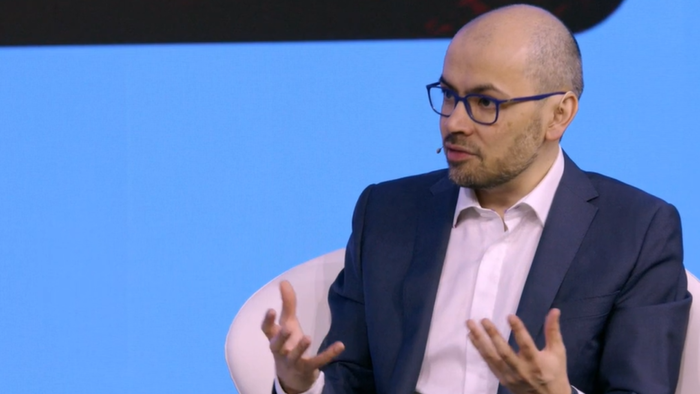Google DeepMind CEO Defends Gemini's Image Flaws - MWC 2024
DeepMind CEO Demis Hassabis said the problem should be fixed in the next couple of weeks

At a Glance
- Google DeepMind CEO Denis Hassabis defended Google's good intentions that put people of color in historically white roles.
- Gemini was creating inaccurate images of historical roles, such as a Latino founding father, to cater to diverse ethnicities.
- He said Google is fixing the problem so Gemini should resume generating images of people in the "next couple of weeks."
The historical inaccuracies in images generated by Google’s Gemini AI model were the consequence of good intentions being applied “too bluntly,” according to Google DeepMind CEO Demis Hassabis.
Last week, users of Gemini - Google's most powerful multimodal model - discovered that it created images of people of color holding positions historically held by white people. Google then halted Gemini's ability to generate images of people as accusations of the company being 'woke' appeared in social media.
At a keynote speech at Mobile World Congress, Hassabis said that the feature will be back online “in a very short order, next couple of weeks.”

Google DeepMind CEO Demis Hassabis
Hassabis said Google built Gemini to cater to its global user base, with its image generation feature designed to produce images of people from various backgrounds.
"For example, put in a prompt that asks for ... a picture of a person walking a dog or a nurse in a hospital," he said. "In those cases, you clearly want a sort of universal depiction, especially if you consider that as Google, we serve 200 plus countries, every country around the world, so you don't know where the users coming from and what their background is going to be or what context they're in. So you want to show a universal range of of possibilities there."
While it was “well-intended” to cater image generation abilities to users from around the globe, Hassabis acknowledged that it “wasn’t working quite the way we intended it to work.”
He said there should be a “much narrower distribution” for historical content, adding: “We care, of course, about historical accuracy. And so, we've taken that feature offline while we fix that.”
Hassabis said that Gemini’s image issue was a nuance of increasingly advanced AI that he described as one “we're all grappling with.”
But despite Gemini’s problems with generating people images, Hassabis expressed confidence in multimodal AI.
“It's phenomenally powerful. And I think it's going to be an amazing thing for users to use when they can use any modality to query about video and stuff like that.”
Asked about the risk of AI models being used by authoritarian regimes to generate propaganda, Hassabis said this is an issue that the whole AI industry is trying to address and it will take involvement by civil society and governments, not just tech companies, to solve it. "It's a social-technical question that affects everyone and should involve everyone to discuss it," he said.
Hassabis noted that "bad actors" can manipulate the use of technology to commit "harmful acts" not intended by the creators of these systems, even using open source models to do so. He said Google just released its own open source smaller models, Gemma, because "we're huge proponents of open sourcing, open science."
"Customers want to use open source systems that they can fully control. But then the question comes, 'how do you ensure what people use downstream isn't going to be harmful with those systems as they get increasingly more powerful?' I think today, it's not an issue because the systems are still relatively nascent," he said.
"But if you wind forward three, four or five years, and you start talking about next generation systems with planning capabilities and be able to act in the world and solve problems and goals, I think society really has to seriously think about ... what happens if this proliferates, and then bad actors all the way from individuals to rogue states can can make use of them as well."
About the Author(s)
You May Also Like


.jpg?width=700&auto=webp&quality=80&disable=upscale)
.jpg?width=700&auto=webp&quality=80&disable=upscale)
.jpg?width=700&auto=webp&quality=80&disable=upscale)
.jpg?width=300&auto=webp&quality=80&disable=upscale)
.jpg?width=300&auto=webp&quality=80&disable=upscale)
.jpg?width=300&auto=webp&quality=80&disable=upscale)
.jpg?width=300&auto=webp&quality=80&disable=upscale)
.jpg?width=300&auto=webp&quality=80&disable=upscale)